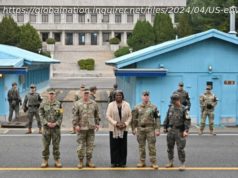North Korea was never going to “denuclearize.”
When Donald Trump’s policy of detente toward North Korea began in March of this year, there were many reasons to be skeptical. Anti-American bellicosity has become a central component of North Korean national mythology. There’s plenty of evidence that Kim Jong-Un is just as vicious and depraved as his father and grandfather were—if not more so. And, most important, the Kim regime has a long history of lying to U. S. negotiators in order to extract concessions.
Trump’s “maximum pressure” campaign was a welcome change from the failed approach to North Korea by his three predecessors. But his eagerness to meet with Kim Jong-un, his spur-of-the-moment decision to announce the summit, his demonstrated ignorance of history, and his penchant for declaring victory before any victory had been won – all of this left us concerned about the outcome of bilateral Trumpian diplomacy with the North Korean regime.
The summit itself was heavy on pageantry and light on substance. Trump signed a document that included vague North Korean promises to “denuclearize”—nearly identical to the promises the regime had signed before—and pronounced the meeting a great success. Trump repeatedly praised Kim Jong-un, offering assurances about the intentions of the North Korean leader that made the U. S. president, in effect, a character witness on behalf of the murderous dictator. Americans could sleep better, the president averred, because of his diplomatic masterstroke.
In the weeks since, U. S. defense and intelligence officials have presented highly credible evidence that the DPRK is currently expanding at least one of its weapons-manufacturing plants and upgrading its nuclear research facilities, as well as fortifying its ability to conceal these efforts. The president responded to these revelations by insisting that everything is hunky-dory. “Many good conversations with North Korea—it is going well!” he tweeted. “In the meantime, no Rocket Launches or Nuclear Testing in 8 months. All of Asia is thrilled. Only the Opposition Party, which includes the Fake News, is complaining. If not for me, we would now be at War with North Korea!”
There’s a lot of untruth in that statement, but perhaps the most revealing point is that Trump takes the cessation of overt provocation as yet more evidence of Kim’s good faith. The halt in saber-rattling is a good thing, but only an unserious person would take that to mean the problem is solved—or as evidence, as Trump put it after his Singapore trip, that “there is no longer a Nuclear Threat from North Korea.”
Now, the North Koreans seem to be publicly mocking the U. S. and its representatives. On a recent visit by Mike Pompeo in which the secretary of state and Kim Jong-Un were to negotiate details of denuclearization, the North Koreans changed the itinerary at the last minute, refused Pompeo promised access to Kim, and wasted much of his two-day visit with banqueting and official hoopla. (The State Department understandably downplayed the snub, claiming there hadn’t been plans to meet with Kim, but before Pompeo’s trip White House press secretary Sarah Huckabee Sanders had explicitly stated that he would “meet with the North Korean leader.”) During the diplomatic small talk in front of the media before the bilateral meetings, North Korean officials tweaked their American counterparts for their optimism about the talks.
The DPRK, as if to emphasize its point, issued a statement immediately after Pompeo’s departure that U. S. demands for denuclearization were “gangsterish.” American calls for “complete, verifiable, and irreversible denuclearization,” the North Korean statement insisted, were “counter to the spirit of the Singapore summit.”
This is a dangerous moment. President Trump, having prematurely touted the summit as a success, looks to have been played. Will he react by seeking to downplay North Korean duplicity in an effort to save face? Or will he return to the over-the-top bellicosity we saw before his dramatic turn toward affection?
At his press conference after the summit, after declaring once again his confidence in the word of Kim Jong-un, Trump joked about this possible outcome. “Honestly, I think he’s going to do these things. I may be wrong and stand before you in six months and say, ‘Hey I was wrong,’” he said, pausing. “I don’t think I’ll ever admit that.”
It’s been just one month, but we don’t think Kim Jong-un is going to do these things. And whether Trump admits he was wrong or not, his ill-conceived, ignorance-on-parade diplomacy could well end up being judged a greater fiasco than the failed approach of his predecessors. And that’s saying something.
We should probably be grateful that the North Koreans are so bad at hiding their intentions. Kim may bamboozle the U. S. president, but he’s highly unlikely to enhance his nuclear capabilities without U. S. intelligence agencies seeing exactly what he’s doing. The North Koreans may be teaching the Iranians how to build a bomb, but they have much to learn from the Iranians about deception. A question worth pondering is why President Trump rightly distrusts Tehran’s protestations of innocence but insists, against all evidence, that Pyongyang is acting in good faith. After Pompeo’s fruitless and, indeed, humiliating trip to North Korea, we trust that the president’s advisers will insist to their boss his policy of detente has failed.






